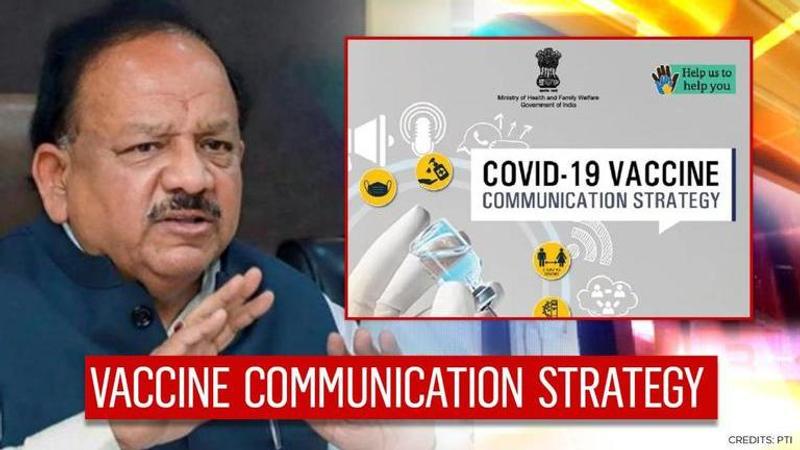Published 13:20 IST, December 31st 2020
Centre's COVID-19 vaccine communication strategy OUT amid wait for approval; Document here
The Health Ministry has released an 88-page document giving out details of its communication strategy to support the rollout of the COVID-19 vaccine in India.

The Union Ministry of Health and Family Welfare on Thursday released an 88-page document giving out details of its communication strategy to support the rollout of the COVID-19 vaccine in India. The introduction of the document says that the communication strategy that supports the COVID-19 vaccine rollout in India seeks to disseminate timely, accurate and transparent information about the vaccine(s) to alleviate apprehensions about the vaccine, ensure its acceptance and encourage uptake.
'Support & encourage appropriate uptake of the vaccines'
The strategy will also serve to guide national, state and district level communication activities, so that the information on the COVID-19 vaccines and vaccination process reaches all people, across all states in the country. It aims to support and encourage appropriate uptake of the vaccines by managing and mitigating any potential disappointment expressed by unmet demand for the vaccine or ‘eagerness’ amongst people; addressing vaccine ‘hesitancy’ that could arise because of apprehensions around vaccine safety, efficacy; and any other myths and misconceptions and providing information on potential risks and mitigate unintended crisis (e.g. AEFI clusters, delay in vaccine rollout for certain population categories) during the introduction and rollout.
The strategy also seeks to build trust and enable greater confidence in the COVID-19 vaccine amongst all people by employing transparency in communication, while also managing any mis/disinformation and rumours around it. According to the Health Ministry, this will be achieved in three ways:
- Using the social influence or endorsements from experts and official voices to:
- Spell out the process of immunization (where, how, who, when - date and time)
- Emphasize on the safety and efficacy of vaccines
- Explain the decision to conduct the drive in a phased manner
2. Establishment of a National Media Rapid Response Cell (NMRRC) at MoHFW to:
- Ensure preparedness through media monitoring and social listening and respond in real-time
- Unfold media and public discourse, through extensive monitoring of print, electronic and digital media
3. Involving community mobilizers and frontline workers to engage with the community at various levels:
- Through community consultations, faith leaders and religious meetings
- Engaging youth, civil-society organizations, self-help groups
- Panchayats and other community-based platforms
The interventions will address four main areas: give information on COVID-19 vaccines, address vaccine hesitancy, build vaccine eagerness and maintain and sustain COVID appropriate behaviours as key preventive behaviours such as wearing masks, maintaining physical distance and handwashing with soap.
The communications approach will further steer the spirit of the Prime Minister of India through Jan Andolan or people’s movement such that citizens feel confident to engage and participate in the vaccination process. COVID Appropriate Behaviours (CAB) must be followed not just during and after vaccination but even otherwise, and also by the people not getting the vaccination in the initial phases.
SEC to meet on January 1
With the United Kingdom (UK) giving approval for emergency usage of the AstraZeneca-Oxford COVID-19 vaccine, India's Subject Expert Committee (SEC) of the Central Drugs Standard Control Organisation (CDSCO) on Wednesday met to consider the request of Pfizer, Serum Institute of India (SII) and Bharat Biotech Pvt. Ltd (BBL). After the meeting, SEC informed that it has analysed and perused the additional data presented by SII and BBL and will meet again on 1 January 2021. American pharma giant - Pfizer, on the other hand, has asked for further time to provide additional data and information.
Coronavirus in India
Meanwhile, a total of 25 people in the country have tested positive for the new UK variant genome of SARS-CoV-2 so far, the Union Health Ministry said on Thursday. These 25 people include the 20 who were found positive with the mutated strain on Tuesday and Wednesday.
India's COVID-19 caseload increased to 1,02,66,674 with 21,822 new infections being reported in a day, while the number of people who have recuperated from the disease surged to 98.60 lakh pushing the national recovery rate over 96%, according to the Union Health Ministry data updated on Thursday. The death toll increased to 1,48,738 with 299 new fatalities, the data updated at 8 am showed
The number of people who have recuperated from the disease surged to 98,60,280 pushing the national recovery rate to 96.04%, while the COVID-19 case fatality rate stands at 1.45%. The COVID-19 active caseload remained below 3 lakh for the tenth consecutive day. There are 2,57,656 active Coronavirus infections in the country which comprises 2.51% of the total caseload, the data stated.
Updated 13:20 IST, December 31st 2020




